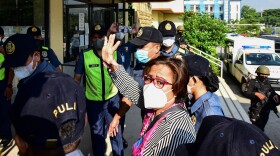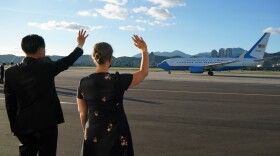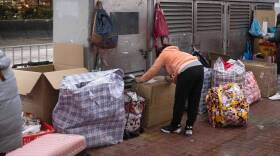
Julie McCarthy
Julie McCarthy has spent most of career traveling the world for NPR. She's covered wars, prime ministers, presidents and paupers. But her favorite stories "are about the common man or woman doing uncommon things," she says.
One of NPR's most experienced international correspondents, McCarthy opened the network's Tokyo bureau, "and never looked back." She has come full circle, recently returning to Asia to open the newest in the constellation of NPR's overseas bureaus in Manila.
In an overseas career spanning 25 years, she's covered Asia, Europe, Africa, the Middle East and South America.
Before assuming her current post as NPR's South East Asia correspondent based in Manila, McCarthy served as NPR's international correspondent based in New Delhi, India, where she spent six years. She'd crossed the border from Pakistan, where McCarthy had established NPR's first permanent bureau in Islamabad.
McCarthy won a Peabody Award for her coverage of Pakistan. She was named the Gracie Correspondent of the Year in 2011, and she was honored with the Southeast Asia Journalists Association's Environmental Award for her coverage of Pakistan's 500-year flood in 2010.
Before moving to Islamabad, McCarthy covered South America as NPR's bureau chief in Rio de Janeiro, Brazil, from 2005 to 2009. She covered the Middle East for NPR from 2002 to 2005, when she was first dispatched to report on the Israeli incursion into the West Bank, and later the war in Iraq and the turmoil in Saudi Arabia.
McCarthy's stint as London Bureau Chief for NPR often took her far afield from Britain. She spent months at NATO covering the war in the Balkans, reported for weeks on the devastating earthquake in Turkey in 1999 and devoted much of summer of 2001 at UN headquarters in Geneva covering the run-up to the Durban Conference on Racism. She covered the re-election of the late Robert Mugabe in Zimbabwe and traveled to the Indian island nation of Madagascar to report on political and ecological developments there.
Following the terror attacks on the United States, McCarthy was the lead reporter assigned to investigate al-Qaida in Europe. She traveled extensively in Iran following the Sept. 11 attacks to report on the Iranian reaction and the subsequent war in Afghanistan.
McCarthy was the first staff correspondent in Japan, assuming leadership of NPR's Tokyo Bureau in 1994. Her tenure there was a rich tapestry of stories including including the Kobe earthquake of 1995, the 50th anniversary of the atomic bombing of Hiroshima and the turmoil over U.S. troops on Okinawa. Her distinguished coverage of Japan won the East-West Center's Mary Morgan Hewett Award for the Advancement of Journalism.
McCarthy's coverage of the Asian economic crisis earned her the 1998 Overseas Press Club of America Award. That same year, McCarthy chronicled the dramatic fall of Asia's longest-running ruler President Suharto and the chaos that followed his toppling from power.
Prior to moving overseas for NPR, McCarthy was the foreign editor for Europe and Africa. She served as the Senior Washington Editor during the first Persian Gulf War. NPR was honored with a Silver Baton in the Alfred I. duPont-Columbia University Awards for its coverage of the conflict.
In her capacity as European and African Editors, McCarthy was awarded a Peabody, two additional Overseas Press Club Awards and the Ohio State Award.
NPR selected McCarthy to spend the 2002-2003 academic year at Stanford University where she won a place in the Knight Journalism Fellowship Program. Her time at the East-West Center in Hawaii in 1994 as a Jefferson Fellow helped launch her long career as an international correspondent for NPR.
McCarthy holds degrees in literature and history, and is a lawyer by training.
-
Supporters say Leila de Lima is a human rights defender still paying the price for speaking out against the abuses of the former president's drug war.
-
From the Philippines to Singapore, countries are worried the status quo could turn from tension to conflict. Southeast Asia especially feels the strain of living in the shadow of U.S.-China rivalry.
-
The current election cycle in the Philippines is being flooded with misinformation. One recent example: malicious sexual content falsely linked to the family of the only female presidential candidate.
-
Ahead of presidential elections taking place in May, Ferdinand "Bongbong" Marcos Jr. is banking on voters' nostalgia for his late father's period of dictatorial rule in the 1970s and 1980s.
-
Many of the domestic workers say they were banished from their employers' homes after getting sick — and fired — even though terminating an employee for falling ill is against Hong Kong law.
-
As an omicron wave sweeps through Hong Kong, some of the nannies and housekeepers from the Philippines who work there have been thrown out by their employers after testing positive for the virus.
-
The Biden administration hopes to make deeper inroads in Southeast Asia but lags far behind China, which has already built up major trade ties, as well as roads and a high-speed rail.
-
Rai is one of the most powerful storms to hit the southern Philippines on record. It's displaced more than 481,000 people and killed more than 150.
-
The law has spawned rancorous court challenges. The court's rejection of one provision represents a win for petitioners, who feared the measure's sweeping definition of terrorism.
-
Hit hard by the pandemic, the Philippines has vaccination rates far lower than neighbors like Vietnam and Cambodia. Here's how the country is trying to up its numbers.









